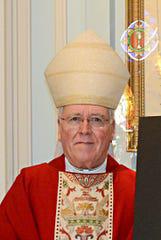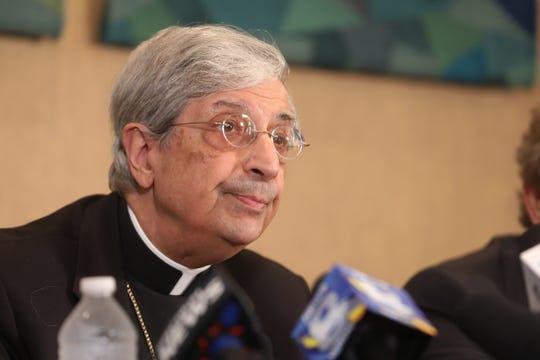|
Survivor group says Pope Francis should have fired Buffalo bishop, calls for more scrutiny across New York
By Steve Orr
[with video] The diocese of Buffalo, like its neighboring diocese of Rochester, has now felt the full effect of the Catholic Church’s roiling child sexual abuse scandal. Buffalo Bishop Richard J. Malone, who was beset by public criticism, internal leaks and outside investigations, is leaving his post early, the Vatican announced early Wednesday. Malone’s departure, coming just three weeks after a meeting with Pope Francis, was widely seen as a rebuke of his handling of abuse allegations. He becomes the the sixth American bishop or cardinal in four years to leave office under the cloud of the church's on-going child sexual abuse scandal. The degree of controversy in Buffalo was unique in New York state, and there was no immediate indication that any of New York's six other bishops or Archbishop Timothy Dolan were in jeopardy. Malone resisted demandsMalone, 73, had led New York’s fourth-largest Catholic diocese since August 2012. He had resisted demands for his resignation, saying he wanted to stay in office until he reached the church’s mandatory retirement age of 75. His role will be filled temporarily by Albany Bishop Edward Scharfenberger. The leadership shuffle was first reported Monday by the Buffalo News. In a statement released by the diocese Wednesday morning, Malone defended his response to abuse allegations but said he had asked Pope Francis to accept his resignation. "Despite the measurable progress we have achieved together, I have concluded after much prayer and discernment that the spiritual welfare of the people of the Diocese of Buffalo will be better served by a new bishop who perhaps is better able to bring about the reconciliation, healing and renewal that is so needed," Malone’s statement said. SNAP, an established advocacy group that supports survivors of child sexual abuse, said it welcomed Malone's departure — though executive director Zach Hiner said thought it would have sent a strong signal to other bishops if Francis had fired Malone rather than allow him to resign. Hiner also said that while Malone’s may have been the most egregious case other church leaders in New York should take note. "It feels like the situation in Buffalo has sucked a lot of air out of the room, but it's clear that more scrutiny is needed in other dioceses too," he said. Hiner specifically pointed to the Brooklyn diocese, where Bishop Nicholas DiMarzio has recently been accused of sexually abusing a boy many years ago. Little controversy in RochesterMalone’s departure is the second major development since a wave of civil suits alleging child sexual abuse by Catholic priests and other ministers began in August. The first was the Rochester diocese filing for Chapter 11 bankruptcy protection on Sept. 12, less than a month after the wave of litigation began. Bishop Salvatore Matano described the move as the best way to provide financial compensation to the scores of people who have filed abuse claims against the diocese while preserving enough assets to continue the church’s public ministry. Rochester became just the 20th Catholic diocese to choose bankruptcy reorganization as a way to deal with child sexual abuse lawsuits, and the first in New York. Lawyers have said they expect other upstate diocese — including Buffalo — to follow suit. Malone said in September he was considering the option. The 12-county Rochester diocese, the fifth-largest in the state in terms of its estimated Roman Catholic population, has not suffered anything like the turmoil that has beset Buffalo. To be sure, there have been times when parishioners complained about the church in Rochester protecting abusive priests, particularly in 2002 when the eruption of the church sexual abuse scandal in Boston led to recriminations across the country. Some local victims came forward to denounce their alleged abusers, and several high-profile lawsuits were filed. Then-Bishop Matthew Clark removed several credibly accused priests from public duties and apologized for not having checked their backgrounds earlier. But the lawsuits were routinely dismissed for statute-of-limitations or other technical reasons, and neither Clark nor his predecessors came in for sustained criticism A Democrat and Chronicle analysis of the allegations contained the 80 or so legal claims filed against the Rochester diocese since August found that three-quarters of the alleged abusive acts took place before 1979, when Clark was named Rochester’s eighth bishop. The rate of alleged abuse was highest during the 10-year term of his immediate predecessor, Bishop Joseph Hogan. In the latter part of Clark's term, which ended in 2012, and during Matano's administration, priests suspected of sexual misconduct have been removed from the ministry more aggressively, and employees and volunteers have been trained to watch for signs of abuse. As a consequence, no new incidents of child sexual abuse by ministers in the Rochester diocese have been reported since 2001. 1,100 claims and countingThe public discontent over the sexual abuse of children by Catholic ministers intensified this year when New York state lawmakers adopted the Child Victims Act, which enables victims of child sexual abuse to file suit against their alleged tormentors and church leaders who shielded them. Lawsuits for most claims must be filed in a one-year window that opened Aug. 14. Since then, about 1,100 Child Victims Act legal claims have been brought statewide. More than 80 percent of them target Catholic dioceses and religious orders. About 250 people have filed CVA claims against the Buffalo diocese, with a cumulative demand for damages that will far outstrip the diocese’s assets. But the allegations laid out in those lawsuits form only part of the problem in the Buffalo diocese. In 2018, Malone released a list purporting to show all the diocesan priests there who had been credibly accused of child sexual abuse. But a diocesan whistleblower, Siobhan O’Connor, made public internal records that showed there were many more accused priests who had been purposefully kept off the public list. The disclosure triggered an FBI investigation that is on-going. The furor was exacerbated by the leaks of audio recordings on which Malone discussed protecting accused priests and hiding diocesan cash from abuse survivors’ lawyers. Prominent Buffalonians called for his resignation and a Buffalo News poll in September found 86 percent of Catholic respondents wanted him gone. Fourth bishop oustedMalone is the fourth U.S. bishop since Francis became pope in 2013 to resign or seek early retirement because of their management of clergy credibly accused of sexual abuse, according to the tracking website BishopAccountability.org. In 2015, the pontiff accepted the resignations of Archbishop John C. Nienstedt and Auxiliary Bishop Lee A. Piche of the St. Paul-Minneapolis archdiocese, and Bishop Robert W. Finn of the Kansas City-St. Joseph, Missouri, diocese. In September of that year Finn was found guilty on a misdemeanor charge for failing to report a priest who later pleaded guilty to federal child pornography charges. Mishandling of allegations against a former Minnesota priest led prosecutors to file criminal charges against that archdiocese, and Nienstedt also was accused of sexual misconduct. In addition, two American cardinals have lost their posts due to the child sex abuse scandal. In October 2018 Francis accepted the resignation of Cardinal Donald. W. Wuerl, a former bishop of Pittsburgh who had received criticism in a Pennsylvania grand jury report over his handling of abuse cases over the course of nearly two decades. In July 2018, Cardinal Theodore McCarrick, former archbishop of Washington, D.C., and auxiliary bishop in New York’s archdiocese, resigned after being accused of the sexual assault of a teenager when he served as a priest in New York City in the 1970s. Contact: SORR@Gannett.com
|
.
Any original material on these pages is copyright © BishopAccountability.org 2004. Reproduce freely with attribution.

